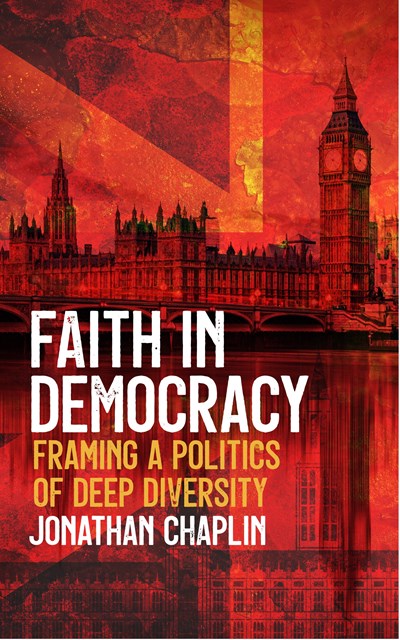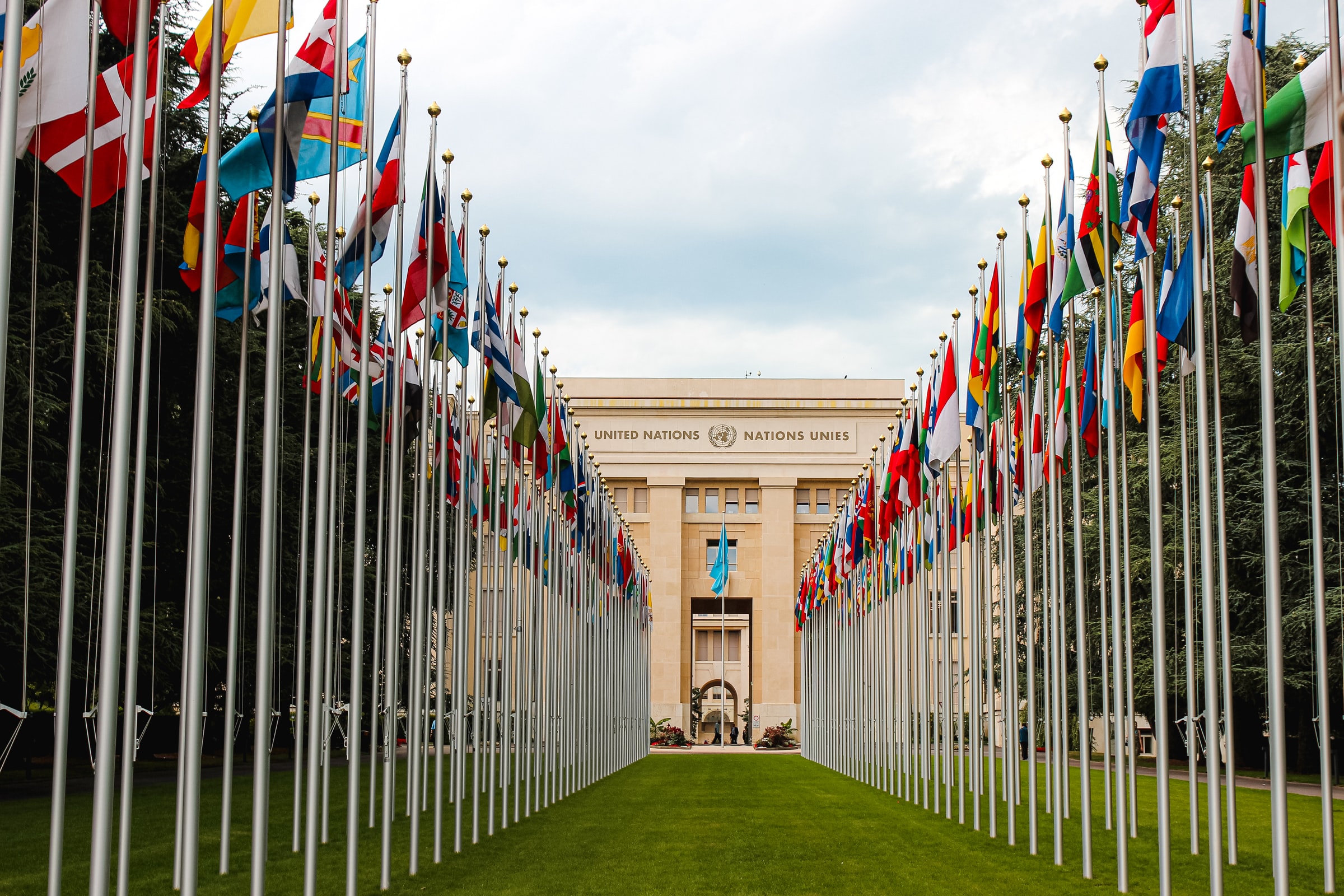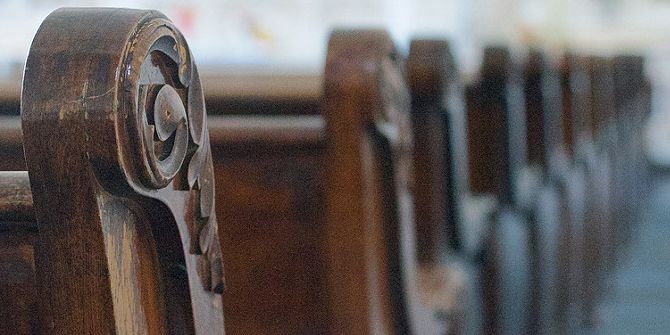What is the place of faith in public life in the UK? This is the question that Jonathan Chaplin explores in his book “Faith in Democracy: Framing a Politics of Deep Diversity”. In this review, Dr Anne Tomlinson outlines the arguments made by Chaplin, highlighting examples of where his thinking is manifest in British society and how this text can be used moving forward. Chaplin’s book can be ordered from SCM Press here.

In the Harold Wilson Annual Lecture 2017 on the role of religion in modern day democracy, Rowan Williams argued that the term ‘liberal democracy’ should be replaced by that of ‘argumentative democracy’; a polity in which multiple communities of conviction engage in vigorous public debate for the common good. ‘Argumentative democracy’ is what Jonathan Chaplin, political theologian, Associate Fellow of Theos, and Member of the Cambridge Divinity Faculty, likewise proposes in this detailed consideration of the place of faith in British public life today. The tightly argued monograph argues for the creation of a capacious conversational space that values and attends to constructive contributions from multiple faith-based perspectives.
Chaplin’s aims are two-fold: clarificatory and programmatic. With regard to the former, he aims to achieve a more informed conversation between religion and democracy, constructing a principled interaction between the two constituencies which nurtures a shared vision for the common good. As for the latter, he seeks to defend a model of constructive faith-based engagement in democratic politics in the UK today, a vision of ‘Christian democratic pluralism’ which does justice to all faiths.
That he succeeds in both is largely due to the clarity with which he sets out the terms of engagement from the outset. In Part 1 Chaplin lays cogent foundations for a theologically informed account of constitutional democracy, defining the terms used and helping readers discern the nature, importance, and moral purpose of such a political tradition: namely the facilitation of a participatory search by state and citizenry alike for public justice. Here, as throughout the book, he draws deeply — and openly — on insights from Christian political thought, seeking to demonstrate their relevance for contemporary democracy. His hope in so doing is to encourage other faiths to ‘make explicit the deeper groundings of their own accounts of democracy’, thus generating a richer dialogue and shared understanding about the place of faith in British democracy.
Part 2 offers an account of the rights and wrongs of secularism, with Chaplin once again guiding his readers skilfully through the forest of terms used in faith and democracy debates: ‘secular’, ‘post-secular’, ‘secularism’ and ‘secularization’. He argues for, and offers a theological defence of, ‘jurisdictional secularism’, the commitment of the state to treat the diverse faiths in its ambit with impartiality and create equal space for their self-expression and democratic activity in the public square. Importantly ‘secularism’ is seen by him as one such ‘faith’ given that it too, like religion, is predicated upon pre-rational commitments. Chaplin argues that the corollary to jurisdictional secularism’s exclusion of religious discrimination is a denial of the granting of public privilege by the state to any faith, this being but one example of the thought-provoking nature of the author’s approach.
The final four chapters which comprise Part 3 examine the constituent parts of a system of Christian democratic pluralism: political reasoning that is grounded in faith-based convictions which are geared to the telos of public justice; latitude for the public manifestation of ‘faithful conscience’ on the part of individuals and ‘faithful association’ on that of faith-based bodies in the provision of public services; and the democratic deployment of the resources of faith towards projects that build public justice. The book ends with a coda on how Christian democratic pluralism, working in partnership with other visions, could help restore trust in democracy itself.
For a book whose stated aim is to be read not primarily by scholars but ‘by reflective practitioners who hold democracy in their hands’ the author pays scant attention — a mere page and a half — to one of the most vibrant examples in the UK today of the very kind of democratic pluralism being advocated, namely ‘broad-based community organising’, described by Luke Bretherton in Resurrecting Democracy: Faith, Citizenship, and the Politics of a Common Life as ‘normatively better than many other forms of democratic citizenship [in] that it entails a commitment to building a common life with others’. Expanding upon the praxis of this ‘practical enactment’ in the way that Angus Ritchie does in Inclusive Populism: Creating Citizens in the Global Age would have directed the intended readership to current manifestations of the ability of faith-based citizens to speak powerfully into the public sphere and so create a deeper and more respectful negotiated pluralism. Public dialogues of the sort which Chaplin desires so ardently and whose contours he describes so helpfully are indeed occurring regularly in the UK; would that such encouraging ‘stories of alternative possibility’, to quote Williams again, had been interrogated more closely so that flesh was put on this particular abstraction.
One target audience who will be very well served by the book, however, is that of students: not only students of politics but more especially those training for ministerial leadership. Chaplin brings together the considerable fruits of his research in several disciplines — political philosophy, political theology and public theology — distilling then into a comprehensive and comprehensible whole, and thereby providing an accessible handbook for those whose work necessitates an understanding of all these modalities. His widespread use of case studies — controversial legal and political decisions taken recently in the UK — has already provided this reader with invaluable material for seminar discussions amongst just such a student body, while the conclusions offered at the close of every chapter summarise the preceding subtle argumentation most helpfully for those who are new to the subject matter. The book offers clarity and creative controversy in equal measure for the intellectual development of such an audience, offering these future congregational leaders (and others) a masterclass in how to navigate wisely between exclusivist secularism on the one hand and ‘Christian nation’ assertiveness on the other. As such, the book serves as a necessary corrective to the more polarised (and less well-informed) manner in which debates about the place of faith in British democracy are usually conducted.
Note: This piece gives the views of the author, and not the position of the LSE Religion and Global Society blog, nor of the London School of Economics. A version of this review originally appeared in the Scottish Episcopal Institute Journal.






